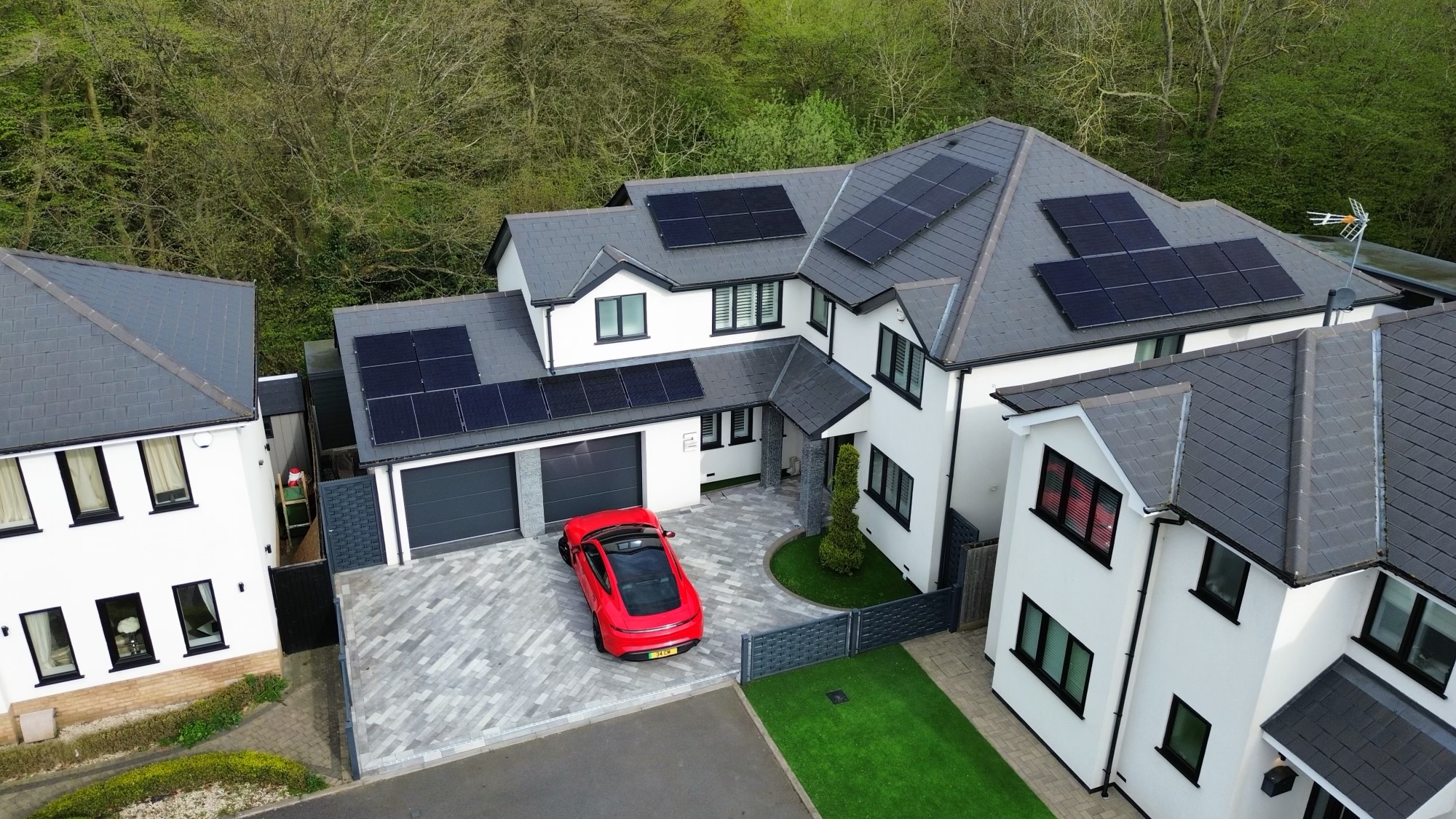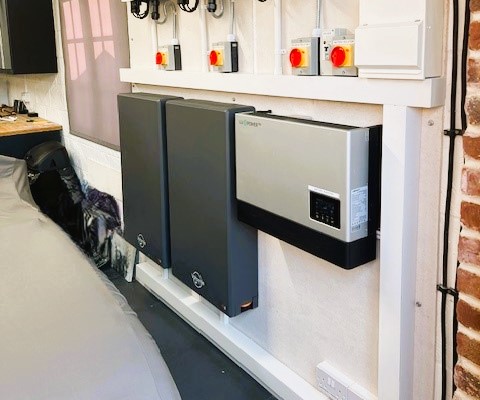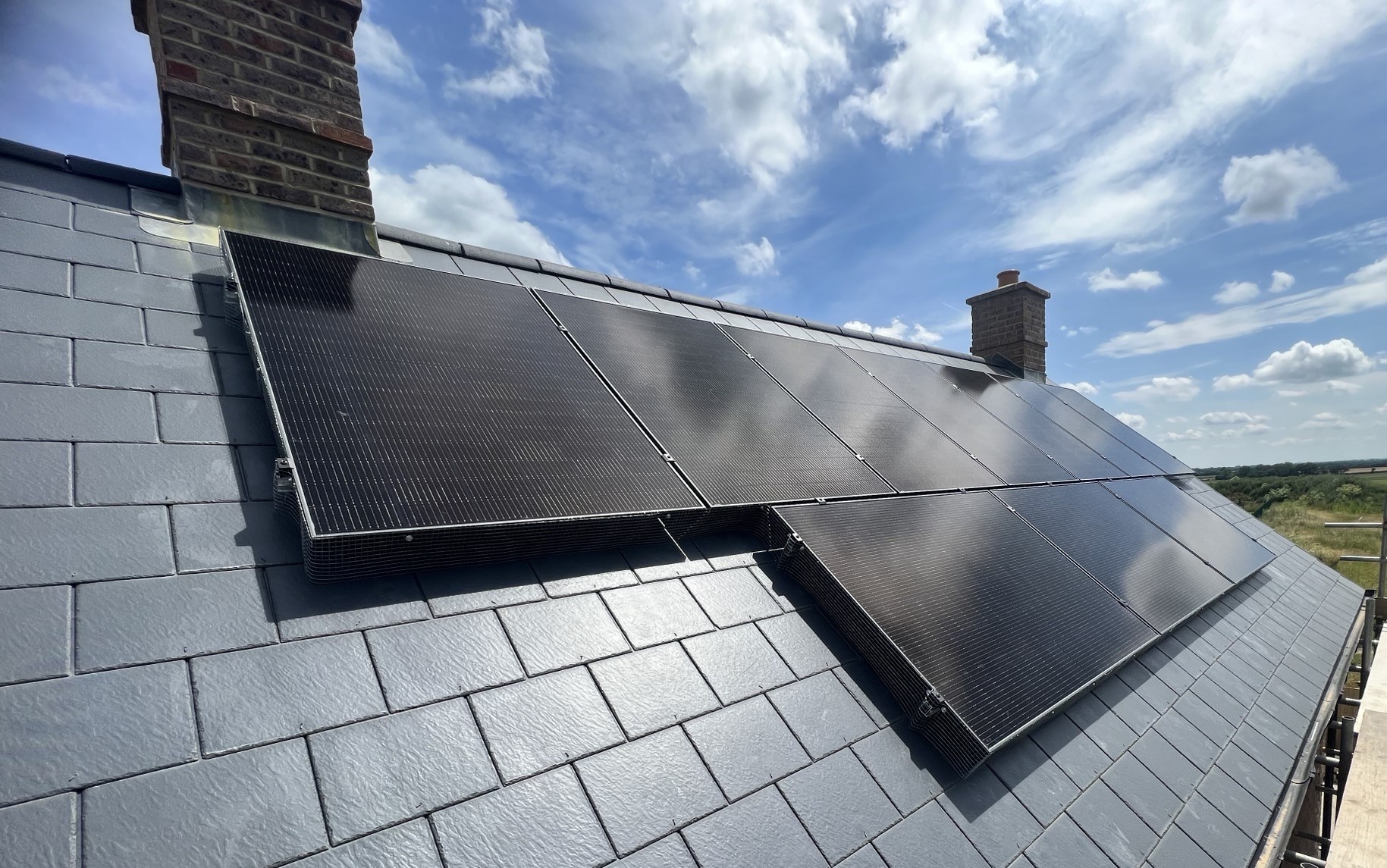What is Solar Panel Battery Storage?
Solar batteries, otherwise known as Solar Battery Storage are battery units that store electricity generated by a solar panel system. Most people are familiar with Solar Panels, and know that they will generate electricity using energy from the sun. Adding battery storage to a solar panel system gives the flexibility of storing this generated electricity for use at another time, thus reducing reliance on grid-generated electricity.
How do Solar Batteries work?
When electricity is generated by solar panels it is in Direct Current (DC), this DC electricity runs through cabling from the panels to an Inverter. The job of the inverter is to turn the Direct Current electricity into Alternating Current (AC) – this is the type of current that is used in our homes to run appliances. The inverter will only send the electricity into the home if the demand at the time is great enough, otherwise the DC electricity will be sent to charge the battery.
The majority of battery storage systems use the same technology to the battery found in a smartphone or an electric vehicle. These are usually Lithium-Ion batteries, which are able to cope with the charging and discharging cycles required and can come in a range of capacities to meet varying energy demands. Other types of battery are available, but these usually have different use cases, such as off-grid systems.
Why are Solar Panel Battery Storage Systems Useful?
Solar panels have become increasingly more efficient in recent years and can generate electricity all year round, even in low light conditions or on cloudy days. However, solar panels are not able to generate electricity at night and will naturally generate less electricity in the mornings and evenings than they will at midday when the sun as it highest. This is where battery storage for solar panels is able to provide the most benefit.
For the average household, there are fewer people at home during the day than there are in the evening and at night. People go to work during the day, or are out doing the other day-to-day errands that are part of modern life. Naturally, with fewer people at home during the day there will likely be less use of energy. But this is when our solar panels are working at maximum performance generating the most electricity – when there is less demand for it in the home!
So what happens to all this excess electricity? Well, typically it is being sold back to the national grid at as part of the Smart Export Guarantee (SEG). This is where the energy provider pays a fee to the homeowner for the electricity supplied by their solar panel system. This isn’t bad at all – the energy companies are paying us for the electricity we have generated! However, the energy companies often buy electricity for a lot less than they sell it for. At the time of writing, export rates vary from 3p per kWh to around 15p per kWh, but to buy electricity from the grid is around 24.5p per kWh. That’s quite a difference!
Let’s look at an example…
A home is generating electricity from their solar panel system during the day when everyone is at work and the kids are at school. Some of this energy is being used running appliances that are always on – the fridge/freezer, the Wi-Fi router, home security system, etc. But a large amount of this electricity isn’t being used, so it is being sold back to the energy provider at 15p per kWh.
Now let’s fast-forward to around 5pm, when the sun is lower in the sky and the solar panel system is generating less electricity. Everyone is coming home from work and the kids are back from school. The TV is on, dinner is being cooked, computers are being used – energy consumption is reaching it’s peak, and once the sun goes down and solar generation stops, the home will be buying that electricity back from the grid at 24.5p per kWh – 9.5p more than it was sold for earlier in the day!
This is exactly why solar panels and battery storage are such a powerful combination. If the home in our example above had a battery storage system, the excess electricity produced during the daytime would be stored in the battery, ready for the evening. The peak demand for electricity could be covered with a sufficiently sized battery storage system, meaning minimal reliance on grid electricity and more savings!
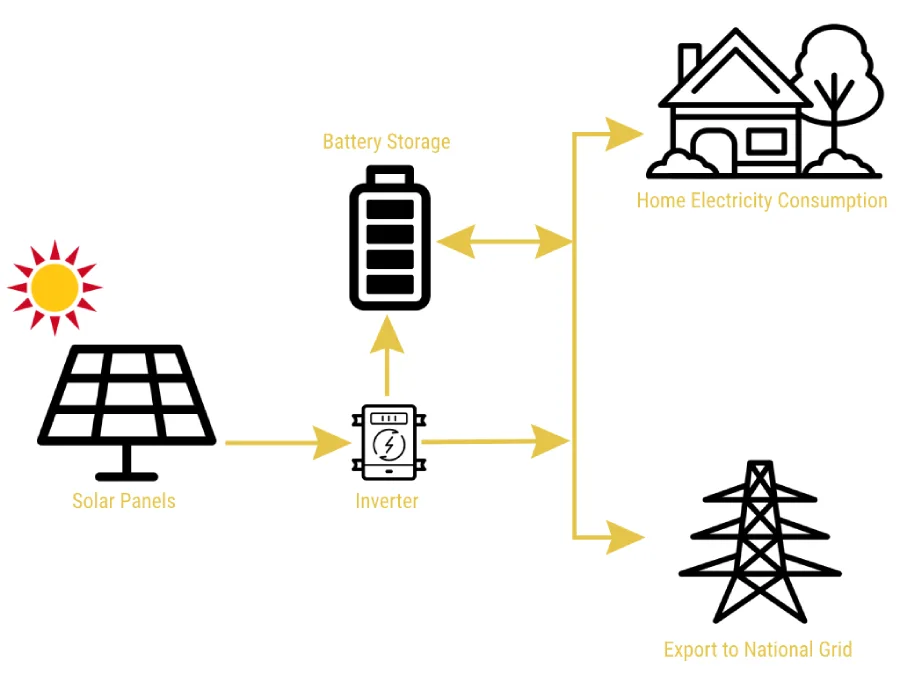
Solar panel battery storage tariffs
With the rising popularity of solar panels and battery storage systems, energy companies have started to introduce time-of-day tariffs to appeal to customers and offer competitive rates for exported excess electricity.
The most notable of these tariffs is provided by Octopus Energy and is called Octopus Flux. This offers different time-of-day rates for buying and selling (exporting) electricity. Depending on usage patterns, this can actually allow customers to buy grid electricity at cheap rates and re-sell what isn’t used at high rates, increasing the potential for savings even further!
Solar Panel Battery Storage Sizes
As we previously mentioned, the majority of solar panel batteries are Lithium-Ion batteries. The reason for this is mainly efficiency – these types of batteries are generally capable of a greater capacity for their size. This means they can store more energy in a smaller amount of physical space. The more electricity that can be stored, the less will be required from the grid!
These types of solar batteries are also more efficient with regards to the amount of energy that can be discharged. All batteries are subject to a degree of energy loss during use – this is known as the Depth of Discharge (DoD). Modern solar batteries are usually capable of discharging around 90% of their capacity, meaning they have a 90% Depth of Discharge. As an example, if you have a battery with a capacity of 10kWh and a DoD of 90% then you will have 9kWh available for use.
Fitting a Solar Battery
Solar panels with battery storage should always be installed by an electrician with the necessary experience to ensure it will be installed and functioning correctly.. Solar panel battery systems can be complex and involve working with high voltage electricity, which can be dangerous if not handled properly. Here at SolarTherm UK we have been installing solar panel battery storage systems for over a decade and all of our electricians are fully qualified and accredited, so you can rest assured that the system will be installed properly and safely.
Can a solar panel battery be installed outside?
This depends on the battery model itself, but there certainly are batteries that are designed to be installed outside. These will typically have a weatherproof rating to ensure that they can withstand the conditions. Some other battery models can be fitted in weatherproof housings that will allow them to be fitted to an exterior wall for example. We have a number of batteries that are rated for exterior installation available at SolarTherm UK. Please contact us if you would like more information.
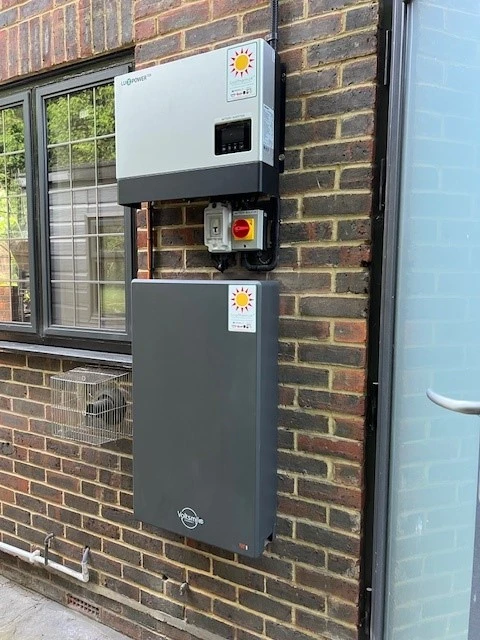
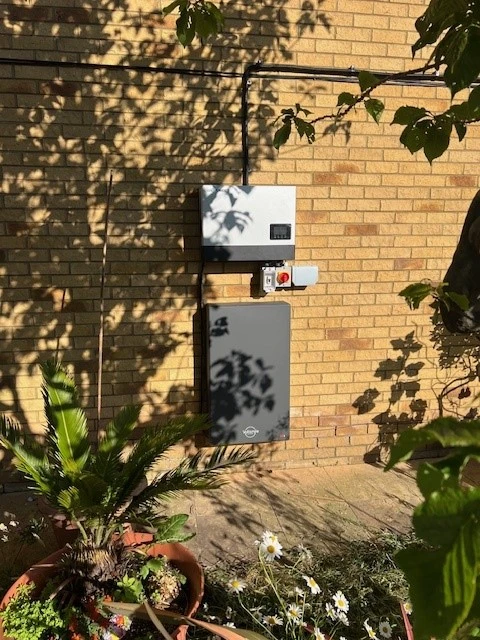
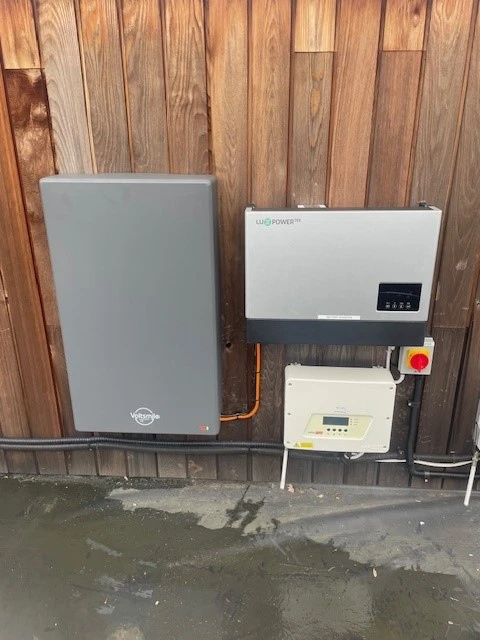
How long do solar batteries last?
The lifespan of any battery will depend on the usage pattern. These types of storage batteries for solar panels are designed to be charged and discharged frequently for many thousands of charge cycles. However, as with all batteries, they are subject to a degree of degradation. Solar batteries will usually be guaranteed to a specific level of degradation over a certain number of years. For example, a battery may be guaranteed to operate to at least 80% of its original capacity over 10 years.
Do solar panel batteries have warranties?
Yes. All the major manufacturers of solar panel storage batteries provide a warranty for the product. The majority of the batteries on the market today have a warranty of 10 years. Here at SolarTherm UK we would not provide or install a battery system that doesn’t have a warranty.
Can battery storage be added to existing solar panels?
Usually, yes! In fact, here at SolarTherm UK we have noticed a recent trend in customers requesting this, and retro-fitting solar panel battery storage is becoming more popular in recent years. Solar panel systems can vary in size and configuration, so if you would like to add solar battery storage to your system get in touch and we will find the best solution!
Which solar panel battery is best?
Like most aspects of a solar panel system, this depends on a number of factors. Primarily, the level of electricity usage in a household and the size of the solar panel system. Solar panels and battery storage are an investment, and like all investments you need to be sure that they are best for you. At SolarTherm UK, we don’t use one-size-fits-all solutions – we make sure that what we recommend is best for each individual circumstance. So if you would like to find your best option, get in touch today and we can make a start on finding the perfect system for you!
Download our solar guide
Get our free guide to Solar Panels. The best resource for starting your journey into Solar.

